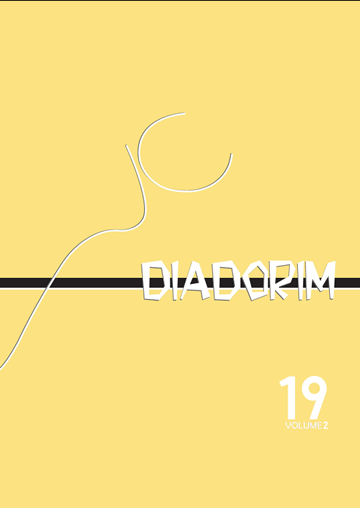O Letramento Linguístico e o Ensino de Gramática da Língua Portuguesa no Brasil
DOI :
https://doi.org/10.35520/diadorim.2017.v19n2a10121Mots-clés :
Letramento, Letramento linguístico, Ensino do português, Ensino de gramática do portuguêsRésumé
Este artigo apresenta as bases teóricas e programáticas que sustentam o conceito de letramento linguístico, delineando suas características principais e situando-o como um dos conceitos basilares da discussão sobre o ensino de língua materna no Brasil. Tais características são empregadas como ponto de partida para uma argumentação crítica acerca das visões hegemônicas da ideia de letramento na pesquisa em ensino no Brasil: o letramento individual e o social. As conclusões oriundas do que se dispõe como letramento linguístico e sua contribuição para a melhoria da qualidade do ensino são o insumo para a discussão de um texto de Francisco Platão Savioli que descreve a história do ensino de gramática no Brasil. Essa análise crítica inspira e motiva observações sobre os problemas estruturais do ensino e da pesquisa na área, e serve de base para a proposição de ações didático-pedagógicas relacionadas à ideia do letramento linguístico como um dos objetivos do ensino de língua portuguesa como língua materna.Téléchargements
Références
BARDONE, E. Seeking chances: from biased rationality to distributed cognition. Berlin: Springer, 168 p, 2011.
BECHARA, E. Ensino da gramática: opressão? liberdade? 3. Ed. São Paulo: Ática, 1987.
BORTONI-RICARDO, S. M.; SOUSA, R.; FREITAS, V.; MACHADO, V. (Orgs.) Por que a escola não ensina gramática assim? São Paulo: Parábola, 2014.
CHAFE, W. Discourse, consciousness, and time. Chicago: The University of Chicago Press, 1994.
CORREA, J. A avaliação da consciência sintática na criança: uma análise metodológica. Psicologia: teoria e pesquisa, Vol. 20 n. 1, p. 69-75, 2004.
DELEUZE, G.; GUATTARI, F. O Anti-Édipo: capitalismo e esquizofrenia. São Paulo: Editora 34, 2011 [1972].
DUNLOSKY, J.; METCALFE, J. Metacognition. Los Angeles: SAGE, 2009.
GOMBERT, J.E. Metalinguistic Development. Chicago: University Press, 1992.
HACKER, D. J.; KEENER, M. C.; KIRCHER, J. C. Writing is applied metacognition. In: HACKER, D. J.; DUNLOSKY, J.; GRAESSER, A. C. (Orgs.). Handbook of metacognition in education. Nova York: Routledge, p. 154-172, 2009.
ILARI, R. A linguística e o ensino de língua portuguesa. São Paulo: Martins Fontes, 1985;
KLEIMAN, A. Modelos de letramento e as práticas de alfabetização na escola. In: KLEIMAN, A. (Org.). Os significados do letramento: uma nova perspectiva sobre a prática social da escrita. Campinas: Mercado de Letras, p. 15-61, 1995.
LEMOS, Cláudia de. Algumas estratégias. Cadernos de Pesquisa, Fundação Carlos Chagas, SP, 1977, no 23.
MOITA LOPES, L. P. Da aplicação de linguística à linguística aplicada indisciplinar. https://posgraduacaofaintvisa.files.wordpress.com/2013/07/aula-01_moita_lopes.pdf. Acessado em 16 de abril de 2016.
MALUF, M. R.(Org.) Metalinguagem e aquisição da escrita: contribuições da pesquisa para a prática da alfabetização. São Paulo: Casa do Psicólogo, 2003.
OLIVEIRA, M. B. F.; SZUNDY, P. T. C. Práticas de multiletramentos na escola: por uma educação responsiva à contemporaneidade. Bakhtinianas, vol. 09, no.2, p. 191-210, 2014.
NOGUEIRA, M. T. Reflexões sobre o tratamento da relação texto e gramática no ensino de língua. In: RODRIGUES, M. G. S.; ALVES, M. P. C.; CAMPOS, S. F. (Ogs.) Ensino de língua portuguesa: gêneros, textos, leitura e gramática. Natal: Editora da UFRN, 014. p. 139-150.
RAJAGOPALAN, K. O ensino de línguas como parte da macro-política linguística. In: GERHARDT, A. F. L. M.; AMORIM, M. A. de.; CARVALHO, A. M. Linguística aplicada e ensino: língua e literatura. Campinas: Pontes/ALAB, 2013, p. 47-73.
RAVID, D.; TOLCHINSKY, L. Developing linguistic literacy: a comprehensive model. Journal of child language, 29, p. 417-447, 2002.
SAVIOLI, F. P. O percurso das gramáticas nas ações escolares. In: NEVES, M. H. M; CASSEB-GALVÃO,V. C. (Orgs.) Gramáticas contemporâneas do português: com a palavra, os autores. São Paulo: Parábola, 2014.
SOARES, M. Letramento: um tema em três gêneros. Belo Horizonte: Autêntica, 1998.
SOARES, M. Alfabetização e letramento. São Paulo: Contexto, 2003.
STREET, B. V. Literacy in theory and Practice. Cambridge: University Press, 1984.
SZUNDY, P. T. C. Educação como ato responsável: a formação de professores de linguagens à luz da filosofia da linguagem do círculo de Bakhtin. Trabalhos em Linguística Aplicada, vol. 53 no. 01, p. 13-32, 2014.
VYGOTSKY, L. S. Pensamento e linguagem. São Paulo: Martins Fontes, 1999.
Téléchargements
Publié-e
Numéro
Rubrique
Licence
Transferência de direitos autorais - Autorização para publicação
Caso o artigo submetido seja aprovado para publicação, já fica acordado que o autor autoriza a UFRJ a reproduzi-lo e publicá-lo na Diadorim: Revista de Estudos Linguísticos e Literários, entendendo-se os termos "reprodução" e "publicação" conforme definição respectivamente dos incisos VI e I do artigo 5° da Lei 9610/98. O artigo poderá ser acessado pela internet, a título gratuito, para consulta e reprodução de exemplar do artigo para uso próprio de quem a consulta. Essa autorização de publicação não tem limitação de tempo, ficando a UFRJ responsável pela manutenção da identificação do autor do artigo.

A Revista Diadorim utiliza uma Licença Creative Commons Atribuição-NãoComercial 4.0 Internacional (CC BY-NC 4.0).

